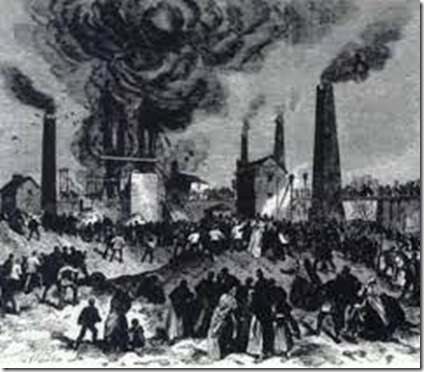 You’ve likely heard this popular quote from Spurgeon:
You’ve likely heard this popular quote from Spurgeon:
Oh, my brothers and sisters in Christ, if sinners will be damned, at least let them leap to hell over our bodies; and if they will perish, let them perish with our arms about their knees, imploring them to stay, and not madly to destroy themselves. If hell must be filled, at least let it be filled in the teeth of our exertions, and let not one go there unwarned and unprayed for. [C. H. Spurgeon, “The Wailing of Risca,” in The Metropolitan Tabernacle Pulpit Sermons, vol. 7 (London: Passmore & Alabaster, 1861), 11.]
But did you know the context of these words?
They were from a sermon by Charles Spurgeon on December 9, 1860 in a sermon entitled The Wailing of Risca. Risca was a mining community in South Wales that was rocked by a devastating mine explosion on December 1, 1860.
Spurgeon was not a distant observer, using this tragedy as a way to proclaim God’s judgment against sinners. This devastating event wasn’t a mere sermon illustration. No, Spurgeon had spent much time in this location. He shared with his congregation a story of a visit to a location near the Black Vein Pit explosion:
I remember how they constrained me, and kept me well nigh to midnight, preaching three sermons, one after another, almost without rest, for they loved to listen to the gospel. God was present with us, and many a time has the baptismal pool been stirred since then by the fruit of that night’s labour. Nor shall I ever forget when standing in the open air beneath God’s blue sky, I addressed a mighty gathering within a short distance of that spot; when the Spirit of God was poured upon us, and men and women were swayed to and fro under the heavenly message, as the corn is moved in waves by the summer winds.
Spurgeon was heartbroken at this tragedy. The tragedy would claim the life 142 men and boys. Some women lost their entire family to this tragedy–father and sons. Some of the stories from the event, those which Spurgeon would have been privy to, fill out his illustration a bit more. Consider this snippet:
Another worker was down the pit with his son at the time. They were running towards the exit when the father could feel himself weakening. It is said he told his son to put his cap over his mouth and lie down with him. The father had quietly crept further back into the mine, knowing he was about to die, and his son tried to feel about for his father, but when he couldn’t find him, he managed to make it out to safety. (source)
The words from this popular Spurgeon quote take upon new meaning when we think of them in the context of a mine explosion and a community tragedy. The points in his sermon were to encourage his hearers to be certain loved ones know the Lord, to make sure they themselves know the Lord, and then (much like Christ in Luke 13) to think upon death and its reality.
—
Photo is from the explosion at the Vein Colliery at Risca in 1860.